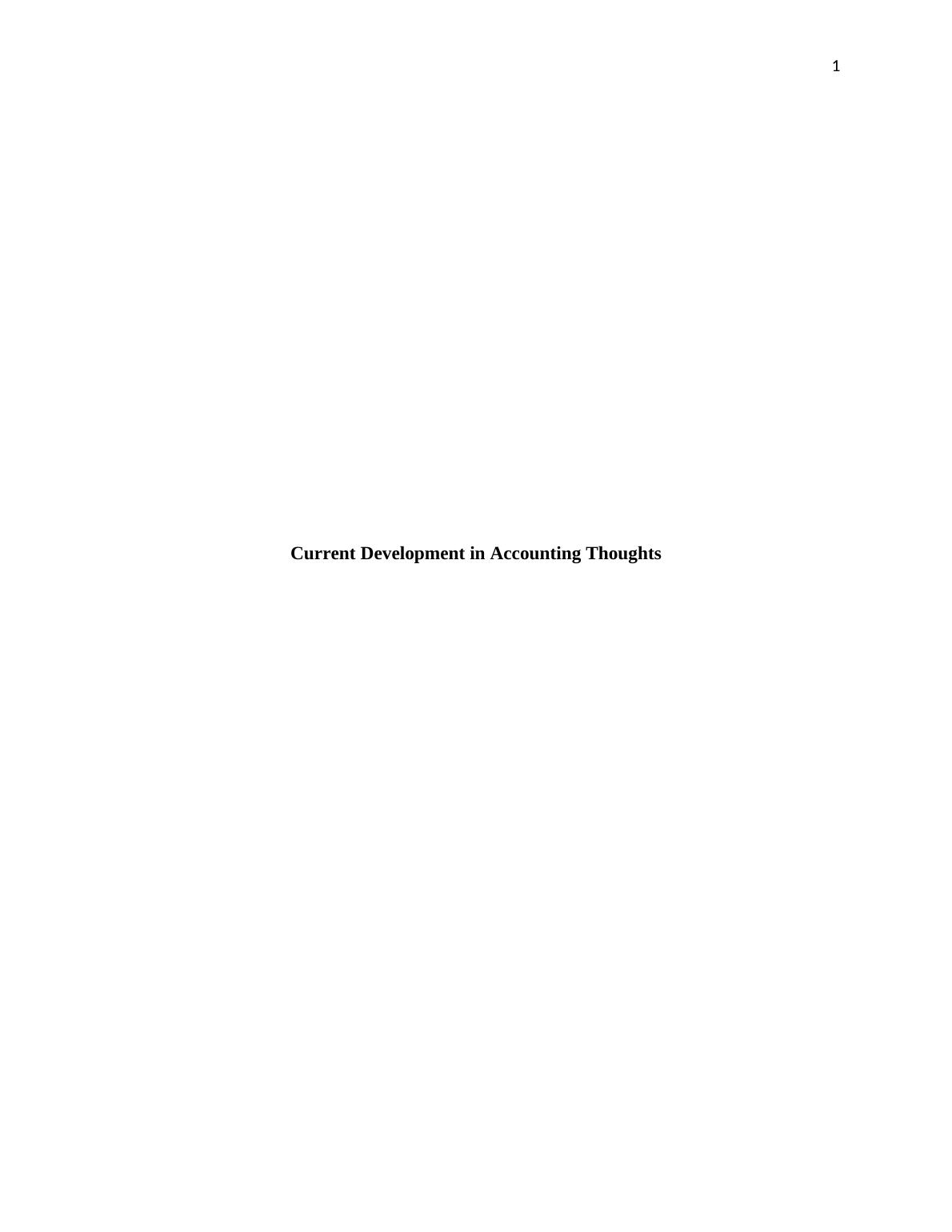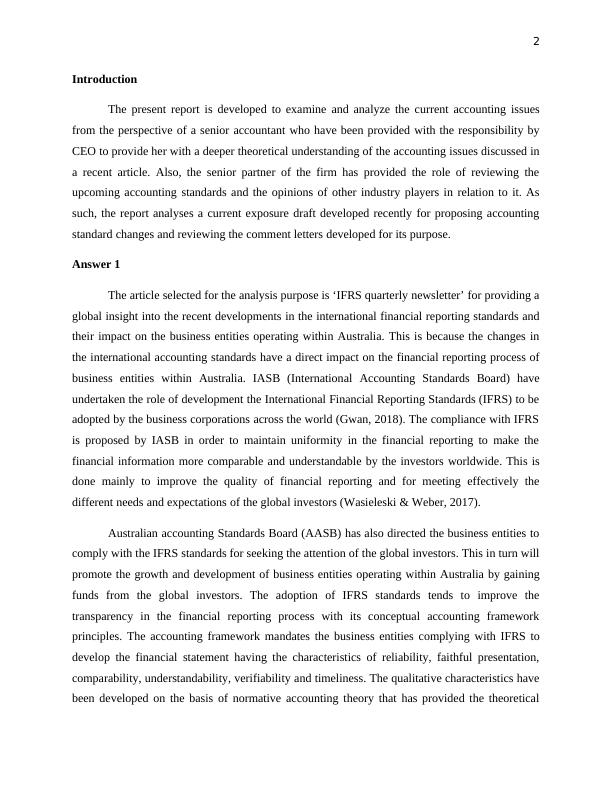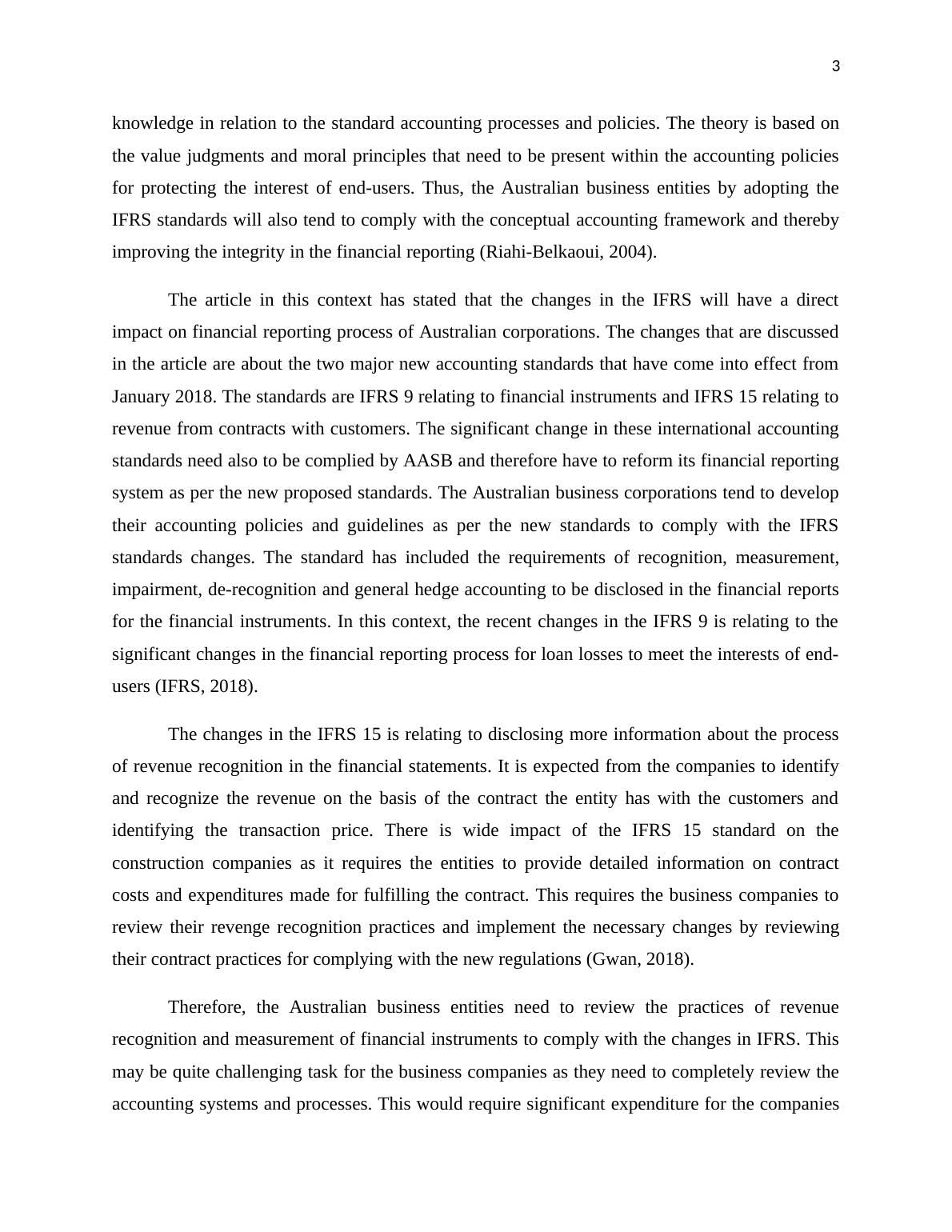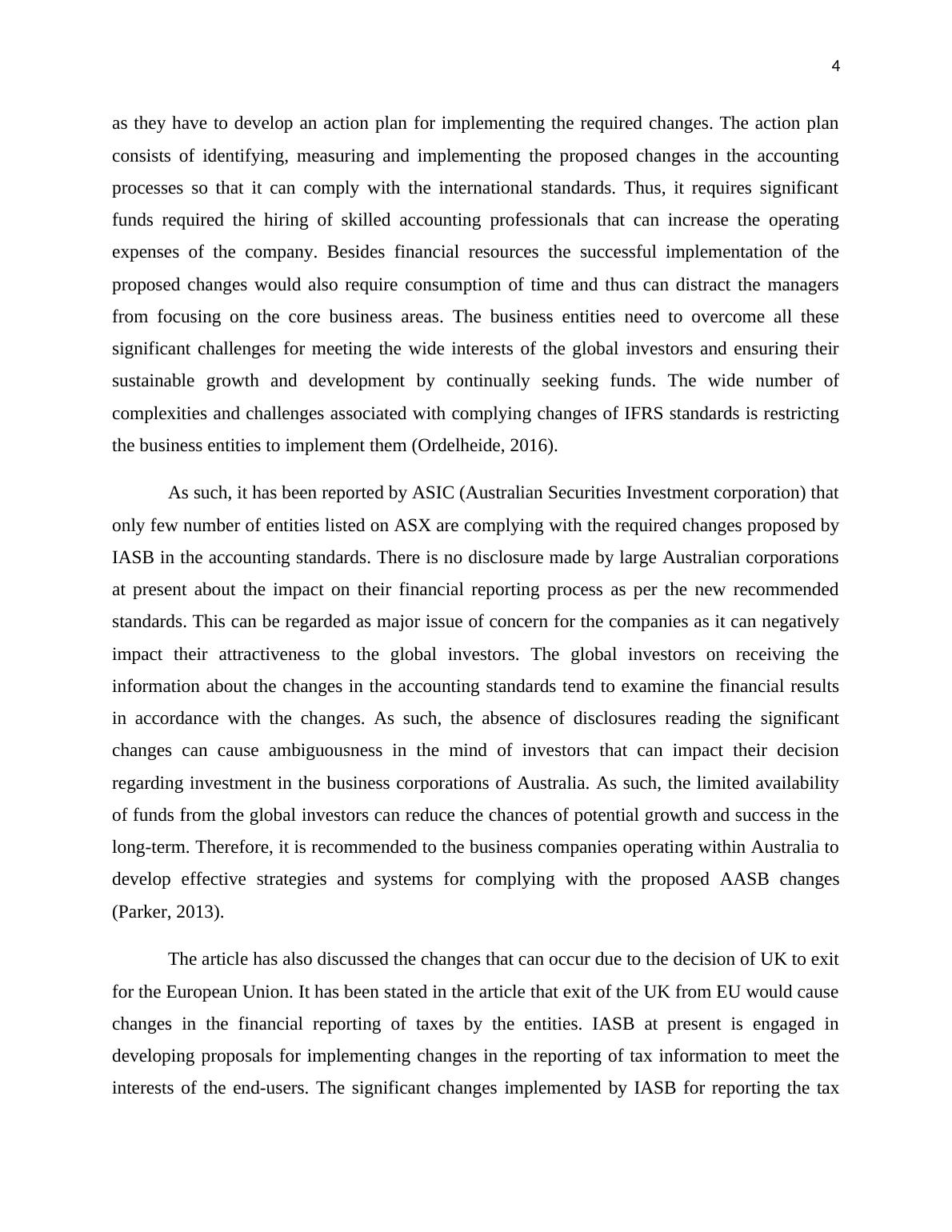11 Current Development in Accounting Thoughts Introduction
Added on 2021-06-15
11 Pages3397 Words54 Views
1
Current Development in Accounting Thoughts
Current Development in Accounting Thoughts

2
Introduction
The present report is developed to examine and analyze the current accounting issues
from the perspective of a senior accountant who have been provided with the responsibility by
CEO to provide her with a deeper theoretical understanding of the accounting issues discussed in
a recent article. Also, the senior partner of the firm has provided the role of reviewing the
upcoming accounting standards and the opinions of other industry players in relation to it. As
such, the report analyses a current exposure draft developed recently for proposing accounting
standard changes and reviewing the comment letters developed for its purpose.
Answer 1
The article selected for the analysis purpose is ‘IFRS quarterly newsletter’ for providing a
global insight into the recent developments in the international financial reporting standards and
their impact on the business entities operating within Australia. This is because the changes in
the international accounting standards have a direct impact on the financial reporting process of
business entities within Australia. IASB (International Accounting Standards Board) have
undertaken the role of development the International Financial Reporting Standards (IFRS) to be
adopted by the business corporations across the world (Gwan, 2018). The compliance with IFRS
is proposed by IASB in order to maintain uniformity in the financial reporting to make the
financial information more comparable and understandable by the investors worldwide. This is
done mainly to improve the quality of financial reporting and for meeting effectively the
different needs and expectations of the global investors (Wasieleski & Weber, 2017).
Australian accounting Standards Board (AASB) has also directed the business entities to
comply with the IFRS standards for seeking the attention of the global investors. This in turn will
promote the growth and development of business entities operating within Australia by gaining
funds from the global investors. The adoption of IFRS standards tends to improve the
transparency in the financial reporting process with its conceptual accounting framework
principles. The accounting framework mandates the business entities complying with IFRS to
develop the financial statement having the characteristics of reliability, faithful presentation,
comparability, understandability, verifiability and timeliness. The qualitative characteristics have
been developed on the basis of normative accounting theory that has provided the theoretical
Introduction
The present report is developed to examine and analyze the current accounting issues
from the perspective of a senior accountant who have been provided with the responsibility by
CEO to provide her with a deeper theoretical understanding of the accounting issues discussed in
a recent article. Also, the senior partner of the firm has provided the role of reviewing the
upcoming accounting standards and the opinions of other industry players in relation to it. As
such, the report analyses a current exposure draft developed recently for proposing accounting
standard changes and reviewing the comment letters developed for its purpose.
Answer 1
The article selected for the analysis purpose is ‘IFRS quarterly newsletter’ for providing a
global insight into the recent developments in the international financial reporting standards and
their impact on the business entities operating within Australia. This is because the changes in
the international accounting standards have a direct impact on the financial reporting process of
business entities within Australia. IASB (International Accounting Standards Board) have
undertaken the role of development the International Financial Reporting Standards (IFRS) to be
adopted by the business corporations across the world (Gwan, 2018). The compliance with IFRS
is proposed by IASB in order to maintain uniformity in the financial reporting to make the
financial information more comparable and understandable by the investors worldwide. This is
done mainly to improve the quality of financial reporting and for meeting effectively the
different needs and expectations of the global investors (Wasieleski & Weber, 2017).
Australian accounting Standards Board (AASB) has also directed the business entities to
comply with the IFRS standards for seeking the attention of the global investors. This in turn will
promote the growth and development of business entities operating within Australia by gaining
funds from the global investors. The adoption of IFRS standards tends to improve the
transparency in the financial reporting process with its conceptual accounting framework
principles. The accounting framework mandates the business entities complying with IFRS to
develop the financial statement having the characteristics of reliability, faithful presentation,
comparability, understandability, verifiability and timeliness. The qualitative characteristics have
been developed on the basis of normative accounting theory that has provided the theoretical

3
knowledge in relation to the standard accounting processes and policies. The theory is based on
the value judgments and moral principles that need to be present within the accounting policies
for protecting the interest of end-users. Thus, the Australian business entities by adopting the
IFRS standards will also tend to comply with the conceptual accounting framework and thereby
improving the integrity in the financial reporting (Riahi-Belkaoui, 2004).
The article in this context has stated that the changes in the IFRS will have a direct
impact on financial reporting process of Australian corporations. The changes that are discussed
in the article are about the two major new accounting standards that have come into effect from
January 2018. The standards are IFRS 9 relating to financial instruments and IFRS 15 relating to
revenue from contracts with customers. The significant change in these international accounting
standards need also to be complied by AASB and therefore have to reform its financial reporting
system as per the new proposed standards. The Australian business corporations tend to develop
their accounting policies and guidelines as per the new standards to comply with the IFRS
standards changes. The standard has included the requirements of recognition, measurement,
impairment, de-recognition and general hedge accounting to be disclosed in the financial reports
for the financial instruments. In this context, the recent changes in the IFRS 9 is relating to the
significant changes in the financial reporting process for loan losses to meet the interests of end-
users (IFRS, 2018).
The changes in the IFRS 15 is relating to disclosing more information about the process
of revenue recognition in the financial statements. It is expected from the companies to identify
and recognize the revenue on the basis of the contract the entity has with the customers and
identifying the transaction price. There is wide impact of the IFRS 15 standard on the
construction companies as it requires the entities to provide detailed information on contract
costs and expenditures made for fulfilling the contract. This requires the business companies to
review their revenge recognition practices and implement the necessary changes by reviewing
their contract practices for complying with the new regulations (Gwan, 2018).
Therefore, the Australian business entities need to review the practices of revenue
recognition and measurement of financial instruments to comply with the changes in IFRS. This
may be quite challenging task for the business companies as they need to completely review the
accounting systems and processes. This would require significant expenditure for the companies
knowledge in relation to the standard accounting processes and policies. The theory is based on
the value judgments and moral principles that need to be present within the accounting policies
for protecting the interest of end-users. Thus, the Australian business entities by adopting the
IFRS standards will also tend to comply with the conceptual accounting framework and thereby
improving the integrity in the financial reporting (Riahi-Belkaoui, 2004).
The article in this context has stated that the changes in the IFRS will have a direct
impact on financial reporting process of Australian corporations. The changes that are discussed
in the article are about the two major new accounting standards that have come into effect from
January 2018. The standards are IFRS 9 relating to financial instruments and IFRS 15 relating to
revenue from contracts with customers. The significant change in these international accounting
standards need also to be complied by AASB and therefore have to reform its financial reporting
system as per the new proposed standards. The Australian business corporations tend to develop
their accounting policies and guidelines as per the new standards to comply with the IFRS
standards changes. The standard has included the requirements of recognition, measurement,
impairment, de-recognition and general hedge accounting to be disclosed in the financial reports
for the financial instruments. In this context, the recent changes in the IFRS 9 is relating to the
significant changes in the financial reporting process for loan losses to meet the interests of end-
users (IFRS, 2018).
The changes in the IFRS 15 is relating to disclosing more information about the process
of revenue recognition in the financial statements. It is expected from the companies to identify
and recognize the revenue on the basis of the contract the entity has with the customers and
identifying the transaction price. There is wide impact of the IFRS 15 standard on the
construction companies as it requires the entities to provide detailed information on contract
costs and expenditures made for fulfilling the contract. This requires the business companies to
review their revenge recognition practices and implement the necessary changes by reviewing
their contract practices for complying with the new regulations (Gwan, 2018).
Therefore, the Australian business entities need to review the practices of revenue
recognition and measurement of financial instruments to comply with the changes in IFRS. This
may be quite challenging task for the business companies as they need to completely review the
accounting systems and processes. This would require significant expenditure for the companies

4
as they have to develop an action plan for implementing the required changes. The action plan
consists of identifying, measuring and implementing the proposed changes in the accounting
processes so that it can comply with the international standards. Thus, it requires significant
funds required the hiring of skilled accounting professionals that can increase the operating
expenses of the company. Besides financial resources the successful implementation of the
proposed changes would also require consumption of time and thus can distract the managers
from focusing on the core business areas. The business entities need to overcome all these
significant challenges for meeting the wide interests of the global investors and ensuring their
sustainable growth and development by continually seeking funds. The wide number of
complexities and challenges associated with complying changes of IFRS standards is restricting
the business entities to implement them (Ordelheide, 2016).
As such, it has been reported by ASIC (Australian Securities Investment corporation) that
only few number of entities listed on ASX are complying with the required changes proposed by
IASB in the accounting standards. There is no disclosure made by large Australian corporations
at present about the impact on their financial reporting process as per the new recommended
standards. This can be regarded as major issue of concern for the companies as it can negatively
impact their attractiveness to the global investors. The global investors on receiving the
information about the changes in the accounting standards tend to examine the financial results
in accordance with the changes. As such, the absence of disclosures reading the significant
changes can cause ambiguousness in the mind of investors that can impact their decision
regarding investment in the business corporations of Australia. As such, the limited availability
of funds from the global investors can reduce the chances of potential growth and success in the
long-term. Therefore, it is recommended to the business companies operating within Australia to
develop effective strategies and systems for complying with the proposed AASB changes
(Parker, 2013).
The article has also discussed the changes that can occur due to the decision of UK to exit
for the European Union. It has been stated in the article that exit of the UK from EU would cause
changes in the financial reporting of taxes by the entities. IASB at present is engaged in
developing proposals for implementing changes in the reporting of tax information to meet the
interests of the end-users. The significant changes implemented by IASB for reporting the tax
as they have to develop an action plan for implementing the required changes. The action plan
consists of identifying, measuring and implementing the proposed changes in the accounting
processes so that it can comply with the international standards. Thus, it requires significant
funds required the hiring of skilled accounting professionals that can increase the operating
expenses of the company. Besides financial resources the successful implementation of the
proposed changes would also require consumption of time and thus can distract the managers
from focusing on the core business areas. The business entities need to overcome all these
significant challenges for meeting the wide interests of the global investors and ensuring their
sustainable growth and development by continually seeking funds. The wide number of
complexities and challenges associated with complying changes of IFRS standards is restricting
the business entities to implement them (Ordelheide, 2016).
As such, it has been reported by ASIC (Australian Securities Investment corporation) that
only few number of entities listed on ASX are complying with the required changes proposed by
IASB in the accounting standards. There is no disclosure made by large Australian corporations
at present about the impact on their financial reporting process as per the new recommended
standards. This can be regarded as major issue of concern for the companies as it can negatively
impact their attractiveness to the global investors. The global investors on receiving the
information about the changes in the accounting standards tend to examine the financial results
in accordance with the changes. As such, the absence of disclosures reading the significant
changes can cause ambiguousness in the mind of investors that can impact their decision
regarding investment in the business corporations of Australia. As such, the limited availability
of funds from the global investors can reduce the chances of potential growth and success in the
long-term. Therefore, it is recommended to the business companies operating within Australia to
develop effective strategies and systems for complying with the proposed AASB changes
(Parker, 2013).
The article has also discussed the changes that can occur due to the decision of UK to exit
for the European Union. It has been stated in the article that exit of the UK from EU would cause
changes in the financial reporting of taxes by the entities. IASB at present is engaged in
developing proposals for implementing changes in the reporting of tax information to meet the
interests of the end-users. The significant changes implemented by IASB for reporting the tax

End of preview
Want to access all the pages? Upload your documents or become a member.
Related Documents
Accounting Theory and Current Issueslg...
|12
|3126
|228
Adoption of IFRS in Australia and UK: A Comparative Analysislg...
|5
|1058
|87
Key Sources of Financial Reporting in Australialg...
|8
|1656
|73
Theory and Progression in the Fieldlg...
|8
|1879
|56
Assignment on Accounting - Telstralg...
|17
|4247
|224
International Financial Report Standards: A Critical Review Abstractlg...
|12
|3363
|475
